Trauma-Informed Support for the Foster Care/Adoption Community
The Restore Network exists to change the culture of foster care in Illinois and equip God’s people to meet the needs of vulnerable children and youth. The children we serve have experienced relational and developmental harm that has resulted in changes to their biology, brain, body, beliefs, and behaviors. The supports and resources we offer are created to equip caregivers, volunteers, child welfare professionals, and our church partners to navigate the joys and complexities of caring for these vulnerable children. The resources we offer are based on the principles of Trust Based Relational Intervention created by the Karyn Purvis Institute of Child Development at Texas Christian University as well as other areas of attachment theory and relational neuroscience which we believe line up with how God created our brain and bodies for relationship and the design plan for human flourishing.
Episodes
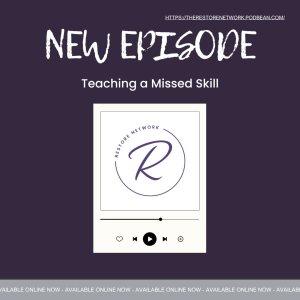
Monday Jun 23, 2025
Monday Jun 23, 2025
A child who has experienced complex developmental and relational trauma, is a child who likely has missed out on learning some important things; skills that help them to navigate life in healthy patterns and enjoy healthy relationships. These missed skills might look like behavioral issues to those adults closest to them, but when you look beyond the surface, you'll see the missing skill...and when you take the time to identify it, you're in a better position to teach it.
But when these kiddos have lived so much of life in a different way, your teaching is probably going to need to be a bit more intentional and less them just passively picking it up.
In this episode, we talk through what making an intentional plan might be like and encourage you to make space for it.
Episode references:
Teaching Children to Play: https://therestorenetwork.org/teaching-children-to-play/
Chasing the Why podcast episode: https://therestorenetwork.podbean.com/e/understanding-unusual-or-challenging-behaviors-by-chasing-the-why/
Accepting No & Negotiating Needs podcast episode: https://therestorenetwork.podbean.com/e/accepting-no-and-negotiating-needs/
Connected Child book, Chapter 5, "Teaching Life Value Scripts" & Chapter 6, "You are the Boss:" https://www.amazon.com/Connected-Child-healing-adoptive-family/dp/0071475001
Say it with Scripts resource booklet & audio recording: https://therestorenetwork.org/say-it-with-scripts/
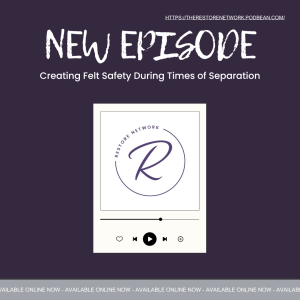
Wednesday Jun 18, 2025
Wednesday Jun 18, 2025
As we continue this series of conversations about felt-safety, we recognize that one of the times that we see fear rear it's ugly head is during times of separation or times when our youth are in the care of people other than us (teachers, daycare providers, babysitters, respite providers, grandma, etc).
This leads foster parents to feel like they don't have a safe space to leave their kids in order to fill their own cups, and they'll likely pull away from community and caring for themselves. This leads to burnout, compassion fatigue, and good foster parents quitting. And this leads to more harm to kids.
In this conversation, we acknowledge why our youth struggle in the care of others and we talk through strategies that disarm fear and help set our children up for success at school, daycare, church, and other childcare situations.
Episode References:
Fear & Felt Safety training module (training credits included): https://therestorenetwork.thinkific.com/courses/feltsafety
Navigating School & Other Childcare Settings training module (training credits included): https://therestorenetwork.thinkific.com/courses/school
Respite training module (training credits included): https://therestorenetwork.thinkific.com/courses/respite
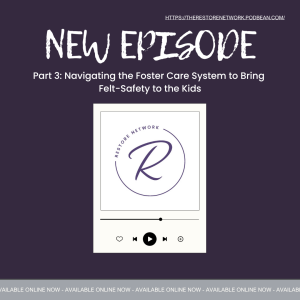
Tuesday May 27, 2025
Tuesday May 27, 2025
In this final Part 3 of the conversation, we recognize that there are many moments of transition for a youth in care. We know that transitions alone can be scary and alerting for us all, but especially for a child with an unknown future and very little voice in the matter.
Youth in care experience the transition of coming into care but then may experience an additional move to a relative or fictive kin, reunification back home, or the transition to adoption/guardianship. While we try to prevent it at all costs, a youth might also experience a disruption from their foster family and a need to move to another one...or experience a mental health struggle that might land them in a hospital or residential stay.
And each of these moves can bring with it more trauma and add more harm to their story.
At each of these moments, the system doesn't always do a good job providing the youth with the felt-safety they need to make the move...but we can do better with this both as professionals and foster families.
We'll cover all these moments of transition in Part 3.
Take a listen to Parts 1-3 of Navigating the Foster Care System to Bring Felt-Safety to the Kids.
Episode references:
How to Talk to Your Child About Being in Foster Care podcast episode: https://therestorenetwork.podbean.com/e/how-to-talk-to-your-child-about-being-in-foster-care/
Talking to Your Children About Foster Care & Adoption templates-email abennett@therestorenetwork.org for access.
Maybe Days: A Book For Children in Foster Care: https://www.amazon.com/-/es/Maybe-Days-Book-Children-Foster/dp/1557988021
Tips for the Transition resource-email abennett@therestorenetwork.org for access.
Restore Network's Trauma Informed Care Support Page: https://therestorenetwork.org/trauma-informed-resources/
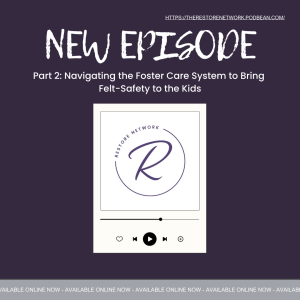
Tuesday May 20, 2025
Tuesday May 20, 2025
In Part 1 of this conversation, we acknowledged that while the foster care system is meant to be a system of protection for children, it doesn't center the child and often does more harm. We specifically discussed how this harm is felt and seen during the transition of a child into foster care, during birth family visits, and in relationship to case worker visits.
In Part 2, we keep the conversation going and address how the system often puts birth parents and foster parents into separate corners causing unnecessary harm to the relationship of the two sets of people who care most about the kid. We then address the system's response to the needs of our youth, often mandating or encouraging services that simply don't work to provide healing. And lastly, we take a look at the roller coaster ride of foster care and encourage foster parents and case workers to get off the ride. How do we get felt-safety as an adult so we can stand on the ground next to the ride holding the hand of the child and sharing our felt-safety with him?
Join us for Part 3 next week.
Episode resources:
Maybe Days: A book for children in foster care: https://www.amazon.com/dp/1557988021?linkCode=ssc&tag=onamzther00e8-20&creativeASIN=1557988021&asc_item-id=amzn1.ideas.2CZA8GTQDJRT0&ref_=aip_sf_list_spv_ofs_mixed_d_asin
Restore Network's Trauma Informed Care Support Page: https://therestorenetwork.org/trauma-informed-resources/
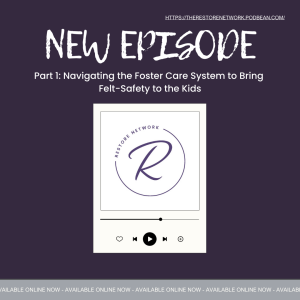
Tuesday May 13, 2025
Tuesday May 13, 2025
Foster Care is meant to be a system of protection for our most vulnerable children, but sadly the system itself often ends up doing more harm. Is this the way it has to be or is there a different way that brings felt-safety to the youth who are caught in the middle of it?
In Part 1 of this conversation, we take a look at a youth's entrance into foster care, issues surrounding birth parent & sibling visits & the possible triggers that come with a case worker's visit to the home. We challenge workers on the front lines and foster parents to do better for our kids.
In Part 2 of this conversation, we will take a look at how the system sets up the biological parent/foster parent relationship, the impact of community service providers, & the roller coaster ride that is foster care.
Episode references:
How to Talk to Your Child About Being in Foster Care Podcast Episode: https://therestorenetwork.podbean.com/e/how-to-talk-to-your-child-about-being-in-foster-care/
Navigating Visit Days-print & audio resource: https://therestorenetwork.org/visit-days/
Restore Network's Trauma Informed Care Support Page: https://therestorenetwork.org/trauma-informed-resources/
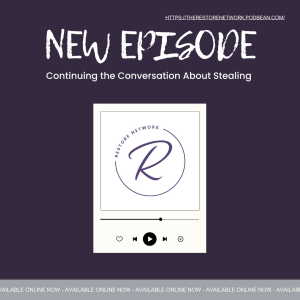
Tuesday Apr 29, 2025
Tuesday Apr 29, 2025
Before you listen to this episode we invite you to go back one and take a listen to the conversation, "Lying & Stealing as Fear Responses," because it sets up the continuing conversation here about stealing.
In this episode we chase the why to increase our empathy and awareness, discuss practical responses to these moments, and unpack our own fear responses that might be complicating how we show up with our children when they engage in stealing behaviors.
Episode references:
"Lying and Stealing as Fear Responses" episode: https://therestorenetwork.podbean.com/e/lying-and-stealing-as-fear-responses/
Fear and Felt Safety training module (training credits offered): https://therestorenetwork.thinkific.com/courses/feltsafety
Food Insecurities resource: https://therestorenetwork.org/food-insecurities/
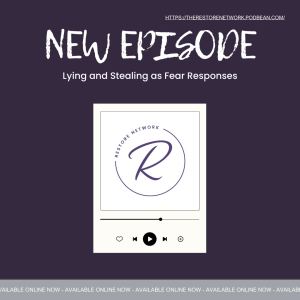
Monday Apr 14, 2025
Monday Apr 14, 2025
Last week we talked about how "fear bullies our children into misbehavior" and we began to name certain behaviors from our kids that could have fear as their underlying cause. Behaviors like food insecurities, sleep struggles, separation anxieties, aggression, and more. After publishing that conversation, I had three people ask me about lying and stealing. So I am continuing our fear conversation and we're "chasing the why" specifically to tackle the challenge of lying.
But closely related to that often for some of our kids is also the behavior of stealing, so you're going to hear me bring up many examples of both in this episode and the "why" behind both behaviors is closely linked. We'll unpack more about stealing next week.
In this episode we tackle:
-lying as learned behavior
-lying as self protection
-lying better understood as "verbal impulsivity"
-lying as a fear response
-our own role in our child's lying
-how not to invite a lie
-how to help create new neural pathways to truth telling and honesty
-lying as highly correlated with FASD
-and more!
Episode references:
Unpacking What We Bring to the Relationship training module (training credits offered): https://therestorenetwork.thinkific.com/courses/whatwebring
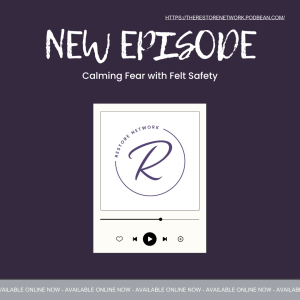
Tuesday Apr 08, 2025
Tuesday Apr 08, 2025
As we continue to grow in our understanding of the youth we all interact with in foster care, fear has to be a big part of that conversation. Our youth have experienced lifestyles of scarcity and caregivers who were often abusive. Their nervous systems got a lot of experience in the fight, flight, freeze, and fawn responses but not a lot of time experiencing calm, regulation, and safety. Because of this, they can often continue to display fear based behaviors in our homes or childcare settings. You might see....
Hypervigilance-asking lots of questions and always looking over their shoulder, unable to settle.
Behaviors that come on suddenly when it gets dark out or you mention it's close to bedtime.
Separation anxieties.
Eating food in hiding and storing the wrappers in strange places.
Running away.
....and so much more.
"Fear bullies our children to misbehavior."-The Connected Child book
But we can help them overcome their fears by being people and setting up environments where they experience felt safety. We can do so by being predictable caregivers-watching our tone, volume and posture and following through on promises. We can provide them with increased structure or rhythms for their days, full of transition cues and rituals. We can overcommunicate when things change or when they'll have new experiences. We can offer them choices so they'll feel in control over these little areas of the life--since so much of their life has felt so out of control. We can help calm the fear response with felt-safety.
Episodes references:
The Connected Child-Chapter 4: https://www.amazon.com/Connected-Child-healing-adoptive-family/dp/0071475001
TBRI Animate: Toxic Stress & the Brain: https://www.youtube.com/watch?v=LTcFTpGve4g
Fear & Felt Safety Training Module (training credits offered): https://therestorenetwork.thinkific.com/courses/feltsafety
"Chasing the Why" podcast episode: https://therestorenetwork.podbean.com/e/understanding-unusual-or-challenging-behaviors-by-chasing-the-why/
Choices & Compromises resource: https://therestorenetwork.org/choices-compromises/
Magnet Schedule: https://www.amazon.com/dp/B01B3GQNP0?linkCode=ssc&tag=onamzther00e8-20&creativeASIN=B01B3GQNP0&asc_item-id=amzn1.ideas.19KHSZORJX6MW&ref_=aip_sf_list_spv_ofs_mixed_d_asin
Timer: https://www.amazon.com/dp/B07WFDZ72L?linkCode=ssc&tag=onamzther00e8-20&creativeASIN=B07WFDZ72L&asc_item-id=amzn1.ideas.19KHSZORJX6MW&ref_=aip_sf_list_spv_ofs_mixed_d_asin
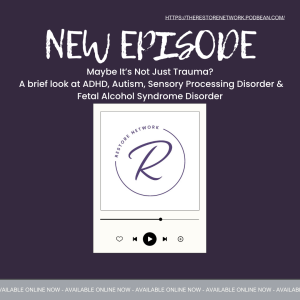
Tuesday Apr 01, 2025
Tuesday Apr 01, 2025
Last week we recognized that because of our kids' early experiences, many of them are stuck in younger stages of emotional regulation and development and need us to lower our expectations and provide more coregulation and support. This is a good starting place for all of us parenting kids with histories of relational and developmental trauma.
And a lot of us will begin to see real healing occur when we do this and provide the kind of supervision, co-regulation, and support our kids need.
But for some of us, we'll still see confusing or difficult behaviors from our kids and wonder what else might be going on.
This is a moment for us to consider whether the "trauma lens" is all we need to have on.
It might be. Or we might need to consider a few other things that make sense of the difference in our kid's chronological and developmental age.
In this conversation we briefly unpack 4 of the most common additional lenses we might need to consider for our kids; ADHD, Autism, Sensory Processing Disorder (SPD), and Fetal Alcohol Syndrome Disorder (FASD).
Episode references:
"Chasing the Why" podcast episode: https://therestorenetwork.podbean.com/e/understanding-unusual-or-challenging-behaviors-by-chasing-the-why/
The Connected Child-Chapter 3: https://www.amazon.com/Connected-Child-healing-adoptive-family/dp/0071475001
The Center for Neurobehavioral Guidance (FASD-Illinois): https://centerforneurobehavioralguidance.org/
Trying Differently Rather Than Harder (FASD): https://www.amazon.com/Trying-Differently-Rather-Than-Harder/dp/0972953205
"TBRI & FASD" podcast episode: https://podcasts.apple.com/us/podcast/tbri-fasd/id1566206875?i=1000669909806
The Connected Therapist: https://www.amazon.com/Connected-Therapist-Relating-Through-Senses/dp/1737205203
The Out of Sync Child (SPD): https://www.amazon.com/Out-Sync-Child-Recognizing-Processing/dp/0399531653
Riley the Brave's Sensational Senses: https://www.amazon.com/Riley-Braves-Sensational-Senses-Challenges/dp/1839973110
"All Things Sensory" Podcast: https://harkla.co/blogs/podcast
ADHD Resource: https://www.canva.com/design/DAF7eJrFzV4/GCZ2pMS_sFG9LMX4jCw7MQ/view?utm_content=DAF7eJrFzV4&utm_campaign=designshare&utm_medium=link2&utm_source=uniquelinks&utlId=h2a501ffdc4
Autism Resource: https://www.canva.com/design/DAF7eEoMi1I/S-gN8yE2KmzH2Xi_gfutIQ/view?utm_content=DAF7eEoMi1I&utm_campaign=designshare&utm_medium=link2&utm_source=uniquelinks&utlId=h072d2a7f1b
SPD Resource: https://www.canva.com/design/DAF7eCQ95WM/AqB27Rg2cmz0t_J2Eo864g/view?utm_content=DAF7eCQ95WM&utm_campaign=designshare&utm_medium=link2&utm_source=uniquelinks&utlId=h7d6ca04222
Sensory Checklist: https://therestorenetwork.org/wp-content/uploads/2023/06/Sensory-Checklist.pdf
For an Occupational Therapy provider list for families in the counties we serve-email abennett@therestorenetwork.org
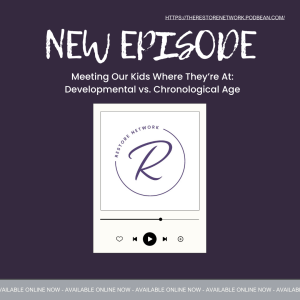
Tuesday Mar 25, 2025
Tuesday Mar 25, 2025
Have you ever thought, why doesn't this child act his age? Have you ever been confused by behaviors coming from your older youth that you'd expect from a younger child? Have you found yourself having to give more supervision, more support, more guidance than you thought you'd have to for a child this age?
If so, then you're beginning to see one of the ways in which children who have complex trauma can get stuck in younger stages of emotional dysregulation and lack the skills that many of their peers might have.
That's the bad news.
But the good news is that when we recognize this, we can change the way we see the child. We can lower our expectations, meet them where they are at, and provide the kind of support and co-regulation that begins to close the gap between their chronological age and their developmental age. This is one example of the "healing" we can offer offer our children as safe, regulated, and connected adults.
Episode References:
Connected Child Book-Chapter 3, page 35: https://www.amazon.com/Connected-Child-healing-adoptive-family/dp/0071475001
Life After Placement: For Foster Families: https://therestorenetwork.podbean.com/e/life-after-placement-foster-families/
